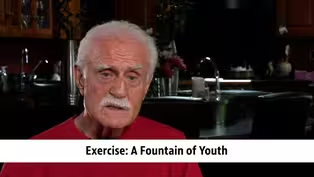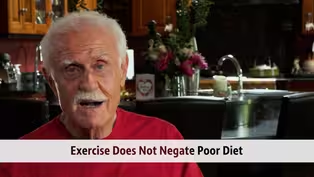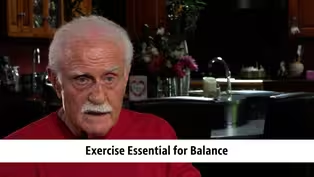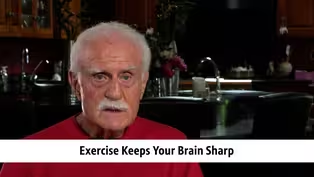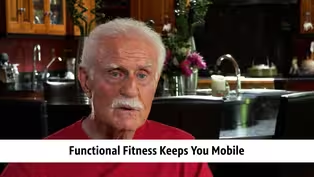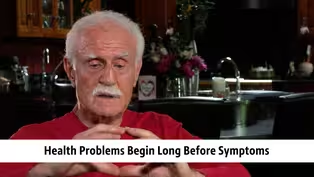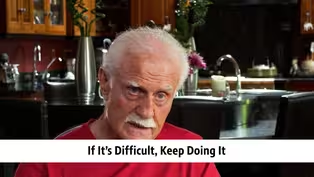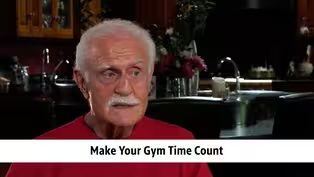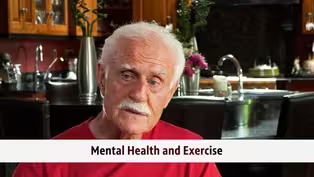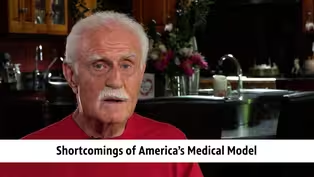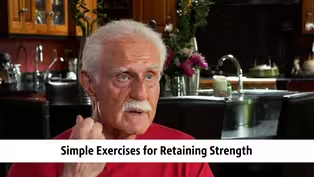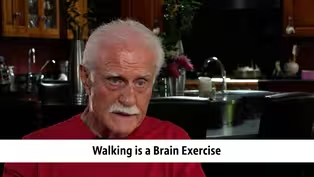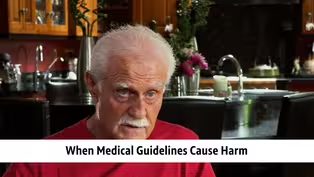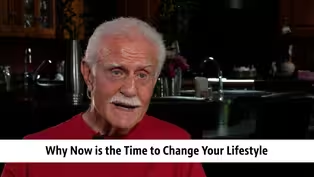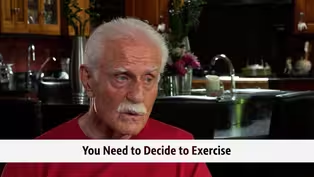KET Forums
You Start Losing Muscle Mass at 30
Clip: Episode 29 | 6m 55sVideo has Closed Captions
Dr. Bryant Stamford discusses how you start losing muscle mass at 30.
Dr. Bryant Stamford, professor of Kinesiology and Integrative Physiology at Hanover College, discusses how you start losing muscle mass at 30.
Problems playing video? | Closed Captioning Feedback
Problems playing video? | Closed Captioning Feedback
KET Forums is a local public television program presented by KET
KET Forums
You Start Losing Muscle Mass at 30
Clip: Episode 29 | 6m 55sVideo has Closed Captions
Dr. Bryant Stamford, professor of Kinesiology and Integrative Physiology at Hanover College, discusses how you start losing muscle mass at 30.
Problems playing video? | Closed Captioning Feedback
How to Watch KET Forums
KET Forums is available to stream on pbs.org and the free PBS App, available on iPhone, Apple TV, Android TV, Android smartphones, Amazon Fire TV, Amazon Fire Tablet, Roku, Samsung Smart TV, and Vizio.
Providing Support for PBS.org
Learn Moreabout PBS online sponsorshipIt used to be that approximately in the mid-forties years ago, you began to lose muscle mass.
Well, now we're down to about the age of 30.
We are so sedentary.
At the age of 30, you begin to lose muscle mass unless you take specific steps to stop it, meaning resistance, exercise.
So starting at the age of 30, you start losing muscle mass.
Now it largely goes unnoticed because what most people will monitor is their weight.
All right.
So if I if I'm 30, £150.
Okay.
And then at 48, £150 and then 50, £150, in my mind, everything is staying the same.
My body is effectively the same.
It's the same.
£250.
No, no, no, no.
Your body has changed remarkably because you continue to lose muscle mass, but it's the muscle mass that drives your metabolic rate.
Okay.
Because it's by far the greatest amount of tissue in the body.
40% of your body weight.
So.
So, so muscle mass drives your metabolic rate.
As you lose muscle mass, what happens to your metabolic rate?
It drops a go.
And of course, you continue to eat in exactly the same way.
So your caloric intake stays here.
And when you're younger, your output is here.
You're not gaining weight.
But as you lose muscle mass, the output gets lower and lower and lower.
Now, the input may stay the same, but the difference between the two is going to result in the addition of fat.
So as you go on in age, your body composition is changing remarkably.
You may still weigh the same hundred and £50, but the amount of muscle mass you have on you gets less and less and less, so much less that if you do make it to 80.
All right.
If you do make it 80, you have probably about half the muscle mass you had as a younger person.
That's how much muscle mass you lose.
So unless you take specific steps to let your muscles know that you care about and they say, here's the battle that's going on, your body hates muscle, your body loves fat, but it hates muscle.
Why is that?
Well, on the day you're born, the prime directive in life is survival.
Survival is predicated on having enough energy.
Okay.
Who is the biggest energy user in the body?
Muscle.
So as far as the body is concerned, muscle is working against it.
From a survival perspective because it gobbles up the energy.
On the other hand, it loves fat because just one little £1 of fat will provide 3500 calories.
A marathon runner go out and run an entire marathon, 26 miles, 385 yards and burn off about £1 of fat.
Okay.
So it is a remarkable repository for energy.
And the body wants energy.
So it always wants more body fat and less muscle mass.
It hates muscle mass.
And so so basically, if there's any way that the body can rid itself of muscle mass, it wants to do that.
So as a kid, for example, I tore up my shoulder really badly and I was in the cash from here to here, okay.
For ten weeks.
By the time that arm came out, it looked like a piece of spaghetti.
All right.
Because the wisdom of my body says muscle is high maintenance tissue.
It takes a lot of energy, even just when it's when you're sitting there at rest, it takes a lot of energy.
And so the body looks at that arm and says, it's useless.
You're not using it.
Why am I sustaining that muscle mass?
So it begins to break down.
You begin to break down the proteins and so forth and so on.
Now you can get it back with rehab and so forth.
But the wisdom of the body said you're not using it.
It's no good to me.
All right.
So let's break it down and get rid of it.
Ironically, the body looked at that as an opportunity.
That's that's what happens on a crash diet.
You know, you're going to crash diet like all these new, new drugs that are coming out that, you know, really very interesting because they kill your appetite.
I mean, I'm talking to people who who will take their favorite food and they're used to just gorging themselves.
They're obese.
They're used to just gorging themselves.
And they take three or four bites.
And it's like, I don't want anymore.
All right.
And so their caloric intake just plummets.
Now, when you go on a crash diet and you normally take in 2000 killed by somebody your size, 1400 calories a day, 5000 calories a day.
Okay.
And we take that down to 500 calories a day.
What happens is your your carbohydrate intake is going to be cut way back.
And now you may have trouble keeping your blood glucose level within the appropriate range.
The problem with that is the brain depends on glucose as fuel.
That's the primary fuel for the brain.
All right.
So if your blood glucose level is in danger of dropping off too far, the body is like, oof, this this is getting serious because they're on a crash diet, Right.
And you're not taking enough calories.
And although you have a little bit of glucose stored in your liver, you burn through that in a day or two.
And so once you burn through that, you lose a couple of pounds because it's stored with water.
But now your glucose level is in danger of going down to low.
And so it's interesting how the body will react to things.
It's almost like the body is gone to a Zig Ziglar conference and they've said the body has said, well, this is not this is not a crisis.
This is an opportunity, because what we can do, this is perfect because we can go to the muscle mass, we can begin to break down muscle because muscle is protein.
Okay.
Those proteins are amino acids.
And some of those amino acids are very, very structurally close to what glucose looks like.
So we can take those amino acids that are close to glucose, then the liver, they can be amended a little bit and turn into glucose.
Perfect.
We can get rid of a whole bunch of muscle.
So on a crash diet, why do you lose weight so quickly?
A big part of it is you lose muscle mass.
So if you listen to them talk about these new weight loss drugs.
One of the big concerns is you're losing a lot of muscle mass.
So what these weight loss drugs are, you know, we're getting off topic here, but what these these new weight loss drug are is basically they are a crash diet with built in willpower because you don't stay on a crash diet very long.
It's too punishing.
But as long as you're on there, you're losing muscle mass primarily a little bit of fat, but mostly muscle mass.
That's why it comes off so fat, because you only have 700 calories per pound of muscle.
3500 calories and a pound of fat.
So you will burn off £5 of muscle in the time that it would take you to burn off £1 of fat.
Video has Closed Captions
Clip: Ep29 | 2m 23s | Dr. Bryant Stamford discuss how exercise is a fountain of youth. (2m 23s)
Exercise Does Not Negate Poor Diet
Video has Closed Captions
Clip: Ep29 | 2m 30s | Dr. Bryant Stamford discusses how exercises does not negate poor diet choices. (2m 30s)
Exercise is Essential for Balance
Video has Closed Captions
Clip: Ep29 | 1m 6s | Dr. Bryant Stamford discusses how exercise is essential for balance. (1m 6s)
Exercise Keeps Your Brain Sharp
Video has Closed Captions
Clip: Ep29 | 3m 22s | Dr. Bryant Stamford discusses how exercise keeps your brain sharp. (3m 22s)
Functional Fitness Keeps You Mobile
Video has Closed Captions
Clip: Ep29 | 2m 56s | Dr. Bryant Stamford discusses how functional fitness keeps you mobile. (2m 56s)
Health Problems Begin Long Before Symptoms
Video has Closed Captions
Clip: Ep29 | 2m 41s | Dr. Bryant Stamford discusses how health problems begin long before symptoms start. (2m 41s)
If It's Difficult, Keep Doing It
Video has Closed Captions
Clip: Ep29 | 4m 38s | Dr. Bryant Stamford discusses why it is important to keep doing exercises that are difficult. (4m 38s)
Video has Closed Captions
Clip: Ep29 | 1m 39s | Dr. Bryant Stamford discusses why it is important to make your gym time count. (1m 39s)
Video has Closed Captions
Clip: Ep29 | 2m 58s | Dr. Bryant Stamford discusses the connection between mental health and exercise. (2m 58s)
Shortcomings of America's Medical Model
Video has Closed Captions
Clip: Ep29 | 2m 26s | Dr. Bryant Stamford discusses shortcomings of America's medical model. (2m 26s)
Simple Exercises for Retaining Strength
Video has Closed Captions
Clip: Ep29 | 2m 19s | Dr. Bryant Stamford discusses some simple exercise ideas that can help you retain strength. (2m 19s)
Video has Closed Captions
Clip: Ep29 | 2m 12s | Dr. Bryant Stamford discusses how walking is a brain exercise. (2m 12s)
When Medical Guidelines Cause Harm
Video has Closed Captions
Clip: Ep29 | 5m 25s | Dr. Bryant Stamford discusses how medical guidelines can sometimes cause harm. (5m 25s)
Why Now is the Time to Change Your Lifestyle
Video has Closed Captions
Clip: Ep29 | 4m 34s | Dr. Bryant Stamford discusses why now is the time to change your lifestyle. (4m 34s)
You Need to Decide to Exercise
Video has Closed Captions
Clip: Ep29 | 5m 44s | Dr. Bryant Stamford discusses the importance of deciding to exercise. (5m 44s)
Providing Support for PBS.org
Learn Moreabout PBS online sponsorship
- News and Public Affairs

Top journalists deliver compelling original analysis of the hour's headlines.

- News and Public Affairs

FRONTLINE is investigative journalism that questions, explains and changes our world.












Support for PBS provided by:
KET Forums is a local public television program presented by KET
